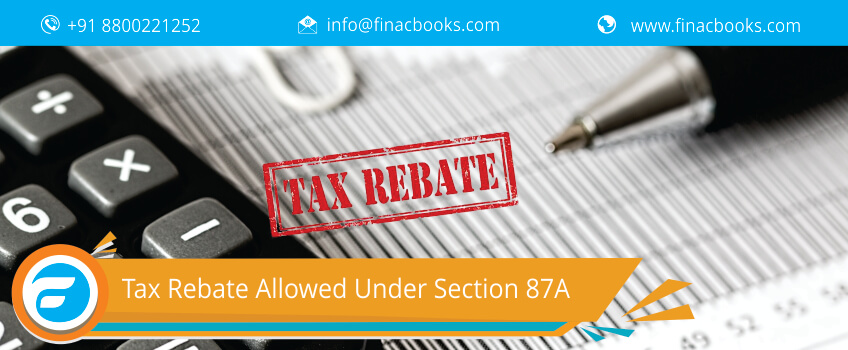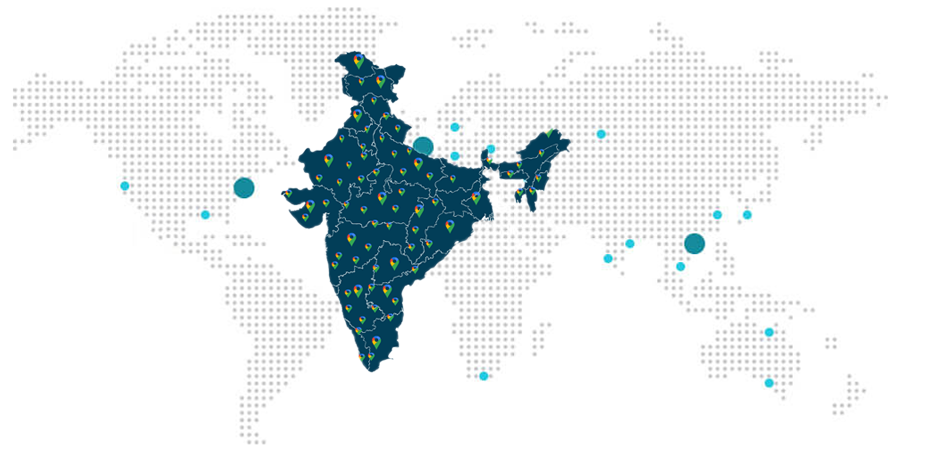Tax Rebate under Section 87A
Categories
Claim maximum Tax Rebate under Section 87A
However much we grouse and complain about paying taxes, it is important to note that our interests will not be served in absence of taxes. Government utilities the tax it collects from various sources to develop infrastructure and various other processes that keep us safe and safeguard our interests.
However, there are various provisions in Indian tax laws that allow taxpayers to claim a rebate on various taxes that are imposed on them.
87A of the Indian Income Tax Act is one such provision that seeks to lesser the burden of taxes on citizens earning below the specified limit by allowing a little additional rebate on their tax obligations.
People belonging to lower income bracket can claim a maximum rebate of INR 2,5000 under Section 87A.

Eligibility Criteria to Claim Tax Rebate under Section 87A
Eligibility Criteria to Access Tax Rebate under Section 87A for FY 2018-19/AY 2019-20
You can claim a tax rebate under Section 87A, if you meet the following criteria.
First and foremost you need to be a Residential Individual. Section 6 (1) of the Income Tax Act, 1961 lays down two sets of parameters to determine if a particular individual is Indian citizen or not. If the person meets any of the following two criteria, he/she will be deemed a resident of the country.
An individual is in the country for 6 months (182 days to be more precise) or more in a financial year. The same is applicable to a Person of Indian Origin (PIO) who is on a visit to India. A PIO is a person whose parents or grandparents were born before the country was partitioned.
Or
An individual is in India for more than two months (60 days) in a financial year or lived for a whole year (365 days) or more during the last four years preceding immediately the current year.
Your total income without taking into account any deduction that you may have claimed under Section 80 should be equal to or less than INR 3.5 lakhs.
The maximum rebate that you can claim is INR 2,500. What it mean is that if total tax obligation is less than INR 2,500, the amount will be rebated under the concerned section (87A). Please also note that the rebate is applied to total tax before 4 per cent by way of Educational CESS is charged.
The rebate under Section 87A allowed to people belonging to lower income bracket and senior citizens can be best illustrated by the example given in the below table.
| Total Income | Tax you need to pay before cess | Total rebate allowed under 87A | Tax Payable + 4% Cess |
| 2,65,000 | 750 | 750 | 0 |
| 2,70,000 | 1000 | 1000 | 0 |
| 3,00,000 | 2,500 | 2,500 | 0 |
| 3,50,000 | 5,000 | 2,500 | 2,500+100=2600 |
Eligibility Criteria to Access Tax Rebate under Section 87A for FY 2017-18/AY 2018-19
You can claim a tax rebate under Section 87 A, if you meet the following criteria.
First and foremost you need to be a Residential Individual. How you can determine your residential status has already been mentioned above.
Your total income without taking into account any deduction that you may have claimed under Section 80 should be equal to or less than INR 3.5 lakhs.
The maximum rebate that you can claim is INR 2,500. What it mean is that if total tax obligation is less than INR 2,500, the amount will be rebated under the concerned section (87A). Please also note that the rebate is applied to total tax before 3 per cent by way of Educational Cess is charged.
The rebate under Section 87A allowed to people belonging to lower income bracket and senior citizens can be best illustrated by the example given in the below table.
| Total Income | Tax you need to pay before cess | Total rebate allowed under 87A | Tax Payable + 3% Cess |
| 2,65,000 | 750 | 750 | 0 |
| 2,70,000 | 1000 | 1000 | 0 |
| 3,00,000 | 2,500 | 2,500 | 0 |
| 3,50,000 | 5,000 | 2,500 | 2,500+75=2575 |
Eligibility Criteria to Access Tax Rebate under Section 87A for FY 2016-17/AY 2017-18
First and foremost you need to be a Residential Individual. How you can determine your residential status has already been mentioned above.
Your total income without taking into account any deduction that you may have claimed under Section 80 should be equal to or less than INR 5 Lakhs.
The maximum rebate that you can claim is INR 5,000. What it mean is that if total tax obligation is less than INR 5,000, the amount will be rebated under the concerned section (87A). Please also note that the rebate is applied to total tax before 3 per cent by way of Educational cess is charged.
The rebate under Section 87A allowed to people belonging to lower income bracket and senior citizens can be best illustrated by the example given in the below table.
| Total Income | Tax you need to pay before cess | Total rebate allowed under 87A | Tax Payable + 3% Cess |
| 2,65,000 | 1,500 | 1,500 | 0 |
| 2,70,000 | 2,000 | 2,000 | 0 |
| 4,50,000 | 20,000 | 5,000 | 15,000 +450= 15,450 |
| 500,000 | 25,000 | 5,000 | 20,000+600=20,600 |
Can NRIs claim rebate under Section 87A?
No. Rebate in taxes under this section is only allowed for Residential Indians.
Who all are eligible to make a claim for rebate under Section 87A?
Only individuals can claim rebate under this section. Hindu Undivided Families (HUFs), companies or firms are barred from making rebate claims under Section 87A.














